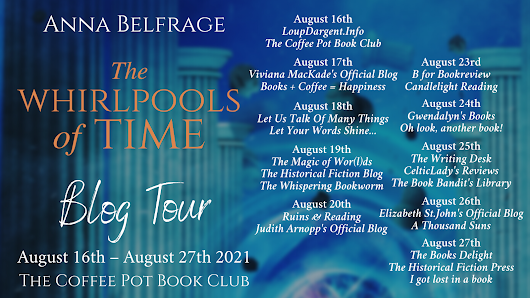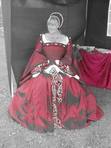Judith Arnopp's Blog, page 21
October 18, 2021
The Coffee Pot Book Blog presents: Traitor’s Knot (Quest for Three Kingdoms) by Cryssa Bazos
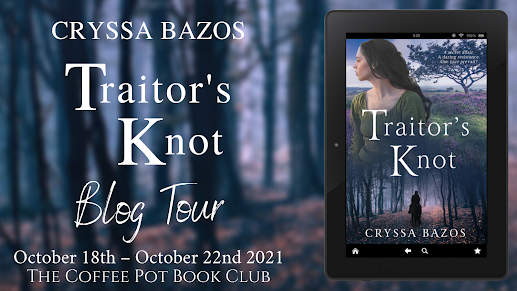
Book Title: Traitor’s Knot
Series: Quest for Three Kingdoms
Author: Cryssa Bazos
Publication Date: 1st October 2021
Publisher: W.M. Jackson Publishing
Page Length: 450 Pages
Genre: Historical Fiction/ Historical Romance

Traitor’s Knot
Quest for Three Kingdoms
By Cryssa Bazos
England 1650:
Civil War has given way to an uneasy peace . . .
Royalist officer James Hart refuses to accept the tyranny of the new government after the execution of King Charles I, and to raise funds for the restoration of the king’s son, he takes to the road as a highwayman.
Elizabeth Seton has long been shunned for being a traitor’s daughter. In the midst of the new order, she risks her life by sheltering fugitives from Parliament in a garrison town. But her attempts to rebuild her life are threatened, first by her own sense of injustice, then by falling in love with an outlaw.
The lovers’ loyalty is tested through war, defeat and separation. James must fight his way back to the woman he loves, while Elizabeth will do anything to save him, even if it means sacrificing herself.
Trigger Warnings:
Violence, animal injury/death.
An excerpt from Traitor’s Knot, by Cryssa Bazos
Elizabeth Seton browsed the household stalls, strolling at her leisure. James walked towards her, his eyes fixed firmly on the prize. She hovered over a collection of linens, and her fingers brushed over the cloths, but she did not linger beyond a curious moment. James kept a discreet distance, ever narrowing the gap. One slim hand held her skirts, raising them slightly to avoid a muddy puddle before she continued on her way.
He halted his progress when she became rooted at the bookseller’s. While fancy ribbons and laces had not attracted her interest, a stack of pamphlets and chapbooks made the difference. She struck up a conversation with the bookseller, laughing at something he said. James rubbed his chin, engrossed. An unusual maid, he thought and drew closer.
Leaning over the small collection, her head tilted to peer at the titles. Hair secured in a sedate knot, a wayward tendril escaped its constraint. The wind lifted and teased the stray lock, contrasting to the paleness of her nape. James fought the urge to reach out and twist the strand in his fingers.
He bent forward and addressed her in a low tone, “Are you looking to improve your mind or to seek instruction?”
Elizabeth started in surprise. Her eyes widened, and for the first time, he realised how blue they were. Almost immediately they narrowed, as though she wasn’t sure how to respond to his boldness. He knew he was being forward, but he had never won a thing without pressing his advantage.
“I am looking for a book on good manners, sir. I would not expect you to recommend one.”
James grinned. Without looking away, he addressed the bookseller, who watched them. “Master Ward, would you be so kind as to introduce us?”
“I would,” the man said. “Only I haven’t made the maid’s acquaintance myself.”
Amusement flitted across her lips. “Elizabeth Seton,” she announced.
“Mistress Seton, may I present James Hart, ostler at the Chequer and Crowne,” the bookseller said, fulfilling his duty.
James swept his hat from his head. “Pleased to make your acquaintance, Mistress Seton.” He rather liked saying her name.
“Master Hart.” Elizabeth canted her head and hesitated for a fraction. She looked at him openly and did not avert her eyes in modesty when he returned her gaze.
“You’re new to Warwick,” he said.
“How would you know this?”
“I know everyone here.”
“Not so,” she said. One brow arched ever so slightly. “You did not know me until this moment.”
James found her bewitching. “I stand corrected Mistress Seton. Still, you are new to Warwick.”
Elizabeth’s head dipped.
“If I were to guess, I’d say you were Mistress Stanborowe’s niece. I’ve heard that Ellendale has a new resident.”
“Indeed, your information is correct.”
“Pray, allow me the privilege of calling on you.” James leaned against the stall and nearly sent a stack of books tumbling.
“My aunt values courtesy, and you, sir, are quite forward. I can only assume she would object.”
“I assure you, mistress, I am not an objectionable fellow,” he said. “Is that not right, Master Ward?”
“Quite true.” The man’s voice shook with laughter.
“There you have it,” James said. “If you can’t trust the word of a bookseller, all is lost.”
A small smile flitted at the corner of her mouth. James found the resulting dimple intriguing. “I must be leaving.” She picked up her purchase and prepared to depart. “God save you, sir, and good day.” She reached over to pay the bookseller, but Master Ward caught James’s warning frown and casually turned away.
“Are women from the south always so aloof?” James blurted, then cringed. Lagging wit—you can do better.
She halted in surprise. “How did you know I came from the south?”
“Far south, I would guess,” he said, grasping the first thing that came to mind.
“How do you suppose?” Her eyes narrowed.
“Naturally, by your speech.”
“Indeed? I could be from London,” Elizabeth replied.
“You are as likely from London as I from Scotland.”
Elizabeth gave up trying to attract the bookseller’s attention and laid her coin atop a pile of chapbooks. She clutched her purchase to her chest in preparation for her escape.
“I will make you a wager,” he said. “If I can guess where you came from, you’ll allow me to call on you.”
“And if you’re wrong?”
“I’ll wish you good day and trouble you no more.” James offered his hand, but she ignored it. “Do we have an agreement?”
Elizabeth held his gaze for a moment. She pursed her lips, and a hint of a dimple lurked at the corners. “Agreed.”
James smiled. He hadn’t forgotten what she had told the highwayman. “Let’s see—I’ll need one word from you.”
“Which one?” Elizabeth asked.
“Owl.”
“Owl?”
“Aye, the very one. Say it again.” He crossed his arms and waited. When she repeated it, he nodded. “’Tis perfectly clear. Your speech has a Dorset flavour.” For truth, she did have a lovely, soft way of speaking.
Elizabeth’s brow arched slightly. “Are you certain I am not from Hampshire?”
“Aye. Admit it, I’m correct.”
“Fine, then, but Dorset is quite large, and that does not prove your wit.”
“An exacting maid. No doubt you’ll want me to do better,” he said with a slow smile. “I’ll need another word from you, then. Two, if you please.”
“Truly? Which ones?” The breeze strengthened, and she brushed a tangled strand from her face. James caught the haunting scent of lavender.
“Welcome home.”
With a smile, she repeated the words. The rosy bow of her mouth fascinated him.
“Unmistakable.” He grinned.
“The verdict?”
“I would lay my life upon it. ’Tis a Weymouth cast.”
“Truly impressive.” Elizabeth’s blue eyes narrowed. “Such a clever fellow to know this only by my speech. Would you not agree, Master Ward?”
This time the bookseller laughed out loud. “Quite so, Mistress Seton.”
“Thank you for your stimulating instruction, Master Hart. I find my time has grown short. Good day.” She nodded farewell to the bookseller and started to walk away.
“What of our wager?” James called out to her.
Elizabeth stopped to face him. “I’ll honour our wager at the time of my choosing. You didn’t stipulate otherwise.”
Universal Link: Amazon UK: Amazon US: Amazon CA: Amazon AU: Barnes and Noble: Kobo:
Author Bio:
Cryssa Bazos is an award-winning historical fiction author and a seventeenth century enthu-siast. Her debut novel, Traitor's Knot is the Medalist winner of the 2017 New Apple Award for Historical Fiction, a finalist for the 2018 EPIC eBook Awards for Historical Romance. Her second novel, Severed Knot, is a B.R.A.G Medallion Honoree and a finalist for the 2019 Chaucer Award. A forthcoming third book in the standalone series, Rebel's Knot, will be released November 2021.
Website: Twitter: Facebook: Instagram: Book Bub: Amazon Author Page: Goodreads:
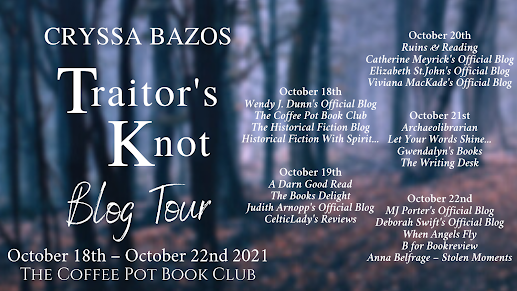
October 11, 2021
The Coffee Pot Blog Tour presents: After Gáirech by Micheál Cladáin
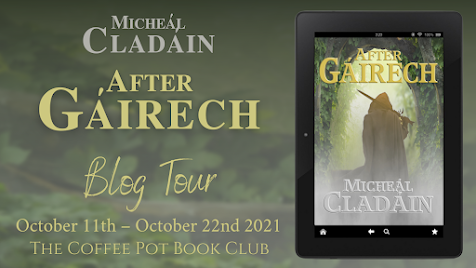
Book Title: After Gáirech
Author: Micheál Cladáin
Publication Date: 30th September 2021
Publisher: PerchedCrowPress
Page Length: 370 Pages
Genre: Historical Fiction
Follow the tour HERE.
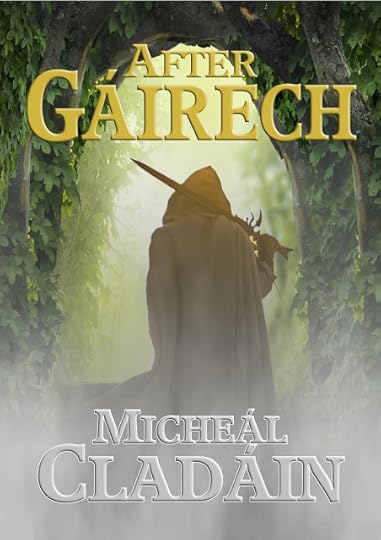
After Gáirech
By Micheál Cladáin
The battle of Gáirech is over; the armies of Connachta, Lagin, and Mumu are destroyed! Survivors are ravaging The Five Kingdoms of Ireland!
While working to resolve the Kingdoms’ issues and bring peace, Cathbadh is murdered, dying in his son Genonn’s arms. Genonn vows to avenge the death of his father.
For his revenge to work, he needs Conall Cernach and the Red Branch warriors of Ulster. But Conall is gone, searching for the head of Cú Chulainn. Genonn sets out to find him, aided by the beautiful Fedelm, the capricious Lee Fliath and the stalwart Bradán.
An Excerpt from After Gáirech
Genonn gazed out over the bay at the emerald-green sea. He did not recall it ever being so green nor so vibrant. Seabirds shrieked their happiness at life, gliding on the updrafts before diving and climbing with wriggling silver in their beaks. And not just the sea. The forest, too, was alive in a way he had not seen before. The smells of recent rains were thick in the air, together with the salty tang blown up the rise by the gusting wind. He fancied he could hear an abundance of forest animals crashing or tiptoeing through the undergrowth, life-affirming noises and smells, a facade of contentment and tranquillity.
But that is all it was. A facade.
The battle two days before had been a bloody affair. Thousands were mouldering on the plains of Gáirech. Those not dead were rampaging through the kingdoms, seeking a replacement for the riches they were promised. Hungry. Hurting. Vengeful. Warriors with a perceived grievance and no fundamental understanding of whom to blame.
‘What do you think?’ Cathbadh asked, pulling him back onto the clifftop.
Genonn did not respond immediately. He just watched Longas retreating down the hill path. If his claims were true, then Cathbadh’s life was in danger. Finally, he turned to his father and said, ‘If he killed Fergus, he will need to kill you, too. He cannot allow that information free rein.’ He would be shunned by warriors throughout the kingdoms of Ireland. Perhaps even beyond Ireland.
‘You saw his face. Heard his words. Do you think he lied?’
‘No. There was glee in it. He was proud of himself.’
‘Yes. I saw it, too. Proud of stabbing a man in the back. I have little understanding of what is happening in the Five Kingdoms. Since when would an Irish warrior feel pride in such a cowardly act?’
Genonn shook his head and once more turned to stare over the bay. If he were honest, he would tell his father he did not understand any of the recent events. The heroes and heroines of Ireland hacking ribbons out of each other on the hill of Gáirech was nonsense at best.
‘If he talks to the Cailleach, she will also send killers after you. If any of this came to light, they would not make her execution a quick affair.’
‘I want to hire a guard, but do not know who I can trust.’
You can trust me, Father, Genonn wanted to snap but kept it to himself. ‘There are plenty of warriors seeking work.’ Warriors who would kill their mother for the adulation of their caste.
‘I know. I know. It is just understanding the best course.’
‘What will we do about him?’ Genonn asked, nodding at the back of the man walking down the hill. It was his father’s turn to peer over the bay, causing Genonn’s frown to deepen. Longas had killed Fergus, and he needed to pay. It was the code Genonn lived by. The code all warriors lived by.
‘We have more pressing business.’
‘There is no business more urgent for me. I shall get after Longas,’ Genonn scoffed. Cathbadh took hold of his wrist and shook his head. ‘He murdered Fergus, Father. A debt is owed.’
‘I agree. However, Longas is a born killer. You are not.’
Genonn turned back to the waves as he asked, ‘What is that supposed to mean?’
Cathbadh raised his eyebrows and said, ‘If you confront him, he will kill you. We will deal with Longas in good time.’
Genonn said nothing but remained on the knoll, watching the confessed killer pass through the gates of Indber Colptha and probably out of his reach. ‘Why am I here?’ As ever, you have no faith in me and yet wonder why I have chosen a different life.
‘I need you to come with me to Dún Dealgan,’ Cathbadh said with an air of indifference, as though Genonn should have known.
‘And what brought Longas here?’
‘I hinted that I knew his secret, so I think he came to kill me.’
‘And yet you live. How can that be?’
‘By distraction and using his failings against him. Getting him to talk of his achievement. He thinks the murder to be a great act of bravery and would boast about it until his jaw broke if he could.’
‘It is monstrous. I never liked him, but he is more vile than I realised,’ Genonn said, shaking his head. ‘How did you know?’
‘I found Medb’s wailing covered in blood all a little too melodramatic. I watched her cut Mac Roth’s throat. There was none of the same emotion. Nothing but cold. And then when I saw Longas slip into camp after we found Fergus, I had my suspicions.’ Cathbadh paused, seeking a high impact, no doubt. Genonn felt his usual irritation start to bubble under what he knew was an outward appearance of calm. Nothing was ever straightforward where his father was concerned.
‘He might have been returning from a call of the wild,’ Genonn offered.
‘No, he was too furtive. I admit, some find natural function embarrassing. I would wager Longas is not the type.’ Cathbadh took hold of his sword hilt and stared up at the screaming seabirds. He seemed to be distracted before turning back to Genonn and saying, ‘I suspected. I needed confirmation, which is why I lured him here.’
‘You took an awful risk.’
‘Not really,’ Cathbadh said, patting the hilt of his sword. ‘He remembered my reputation when he saw I was armed.’
So, I will die if I confront him, but you will be fine. Genonn could not believe the arrogance of his father, which age had failed to dampen. Gaining time, he listened to the still shrieking seabirds. Warriors were rampaging through Ireland, seeking a replacement for the wealth they were promised and killing to get it. He would not do what they were doing but did that make him less of a warrior? Not to his mind. He trained with Scáthach on the Shadowy Isle. How many of those at the battle could say the same?
‘Do you really think sight of your sword deterred him?’
Cathbadh shook his head and shrugged. Genonn realised his father did not have any idea why Longas did not kill him. Patting his hilt and implying his sword was the reason had just been his usual bluff.
‘So, are you coming with me to Dún Dealgan?’
Genonn nodded. He owed Fergus a debt, and attending the funeral would not go even a little way to repaying it.
‘We can hire horses in Indber Colptha,’ he said as he started down the hill, not bothering to check if Cathbadh was following.
Available on KindleUnlimited.
Amazon UK: Amazon US: Amazon CA: Amazon AU:
 Micheál Cladáin studied the classics and developed a love of ancient civilizations during those studies. Learning about ancient Roman and Greek cultures was augmented by a combined sixteen years living in those societies, albeit the modern versions, in Cyprus and Italy. As such, Micheál decided to write historical fiction, trying to follow in the footsteps of such greats as Bernard Cornwell and Conn Iggulden. Because of his Irish roots, he chose pre-Christian Ireland as his setting, rather than ancient Italy or Greece.
Micheál Cladáin studied the classics and developed a love of ancient civilizations during those studies. Learning about ancient Roman and Greek cultures was augmented by a combined sixteen years living in those societies, albeit the modern versions, in Cyprus and Italy. As such, Micheál decided to write historical fiction, trying to follow in the footsteps of such greats as Bernard Cornwell and Conn Iggulden. Because of his Irish roots, he chose pre-Christian Ireland as his setting, rather than ancient Italy or Greece.Micheál is a full-time writer, who lives in the wilds of Wexford with his wife and their border terriers, Ruby and Maisy.
Twitter: Facebook: Amazon Author Page:
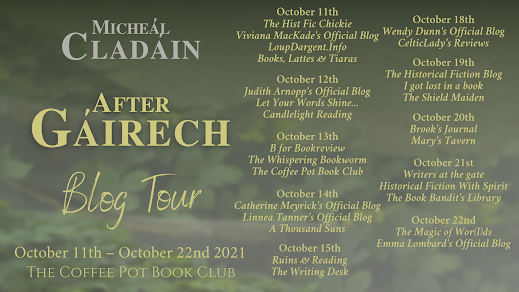
October 10, 2021
Jenny Knipfer stops by as part of her Coffee Pot Book Club Blog Tour!
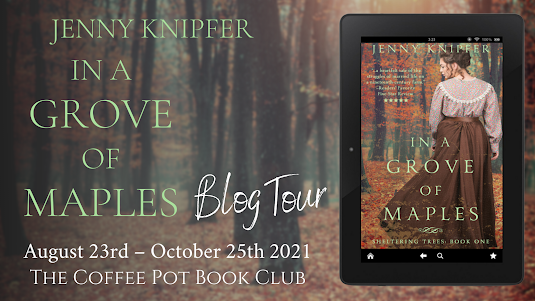
Book Title: In a Grove of Maples
Series: Sheltering Trees: Book 1
Author: Jenny Knipfer
Publication Date: 1st July 2021
Publisher: Jenny Knipfer--Author
Page Length: 264 Pages
Genre: Historical Fiction, Christian Historical Fiction

In a Grove of Maples
(Sheltering Trees: Book 1)
By Jenny Knipfer
Audio Narrated By Jenn Lee
"... a heartfelt tale of the struggles of married life on a nineteenth-century farm. Edward and Beryl are both relatable and sympathetic. Knipfer expertly captures the emotion and stress of their lives and relationship. It’s a touching and realistic portrayal of love, loss, and friendship." Heather Stockard for Readers’ Favorite five-star review
A HISTORICAL NOVEL OF THE PERILS OF NEWLYWED LIFE ANDF ALL THAT COMES TO DIVIDE LOVERS
In 1897 newly married Beryl and Edward Massart travel more than one thousand miles from Quebec to farm a plot of land in Wisconsin that they bought sight-unseen. An almost magical grove of maples on their property inspires them to dream of a real home built within the grove, not the tiny log cabin they’ve come to live in.
Misunderstandings and tempers get the better of them when difficulties and troubles arise. Just months after they wed, Edward leaves pregnant Beryl in the midst of the coming winter to tend the farm and animals while he goes to be a teamster at a northern Wisconsin logging camp.
Will Beryl and Edward walk into the future together to build their house of dreams in the grove of maples, or will their plans topple like a house of sticks when the winds of misunderstanding and disaster strike?
Readers of Christian historical fiction, Historical fiction, Women’s fiction, and Christian historical romance will be endeared to this slice of late 19th century farm life.
Excerpt from In a Grove of Maples
“No! Oh, God . . . why? Why!”
She dropped to her knees, hanging her head over her dead son, and the tears started. She sobbed and sobbed until his body was wet with her tears. Finally, Beryl breathed in deeply, dried Lyle’s chest off with the sleeve of her nightgown, and wrapped him back up. She walked back to the hearth and sat in her rocker with him before the fire, cradling him in her arms. She rocked on and on, mesmerized by the flames, her mind numb from reality. The chair creaked as she rocked, the clock ticked, and slow tears leaked from her eyes and thickened her throat, making her feel as if she were being choked. A faint taste of blood lingered in her mouth.
Now I really am alone.
Beryl sobbed again, and the need for another living, breathing body consumed her. She jumped up, still holding Lyle tightly in one arm, and ran to where the large, metal triangle and hammer hung from a nail in a log on the wall. Her fingers fiddled with the lock and latch before throwing the door of the cabin wide open. In her nightgown and stockinged feet, she was oblivious to the cold and the snow. Her long, loose hair served as a shawl around her shoulders.
The sun lingered over the treetops to the east. She stepped out a few yards from the cabin and rang the triangle as best she could while she clutched Lyle with one arm. Snowflakes fluttered down from the sky like broken bits of cotton.
Beryl hoped Nola and Paul would hear and come help her as they had promised. She rang the triangle with the hammer over and over until her arm hurt from the ringing. She dropped it, and the triangle fell from her hand into the snow. She followed.
Huddled in the snow with only her sleepwear on, Beryl clutched Lyle to her chest, wishing she could transfer her heartbeat to him and her breath to his lungs.
“Please come soon. Please come soon,” she chanted over and over again as she rocked on her knees, not caring how they stung in pain from the cold.
Let them sting. The pain could never equal the wound which had entered her soul when Lyle had slipped away.
Accusations cropped up in her thoughts. I should have checked on him before; I should have known something was wrong; I should have taken better care of him!!
Beryl nestled her lips close to the tender spot behind Lyle’s ear and kissed him. She breathed in the scent of him—powdery and soft, like the promise of spring rain—and keened quietly into the crook of his neck.
A sudden thought crushed her even more. Edward will never get to hold his son!
That realization killed her, and Beryl grieved for her husband and all they had lost, while the snow continued to fall thickly around her.
Read FREE on Kindle Unlimited
Universal Link: Amazon UK: Amazon US: Amazon CA: Amazon AU:
 Jenny Knipfer lives in Wisconsin with her husband, Ken, and their pet Yorkie, Ruby. She is also a mom and loves being a grandma. She enjoys many creative pursuits but finds writing the most fulfilling.
Jenny Knipfer lives in Wisconsin with her husband, Ken, and their pet Yorkie, Ruby. She is also a mom and loves being a grandma. She enjoys many creative pursuits but finds writing the most fulfilling.Spending many years as a librarian in a local public library, Jenny recently switched to using her skills as a floral designer in a retail flower shop. She is now retired from work due to disability. Her education background stems from psychology, music, and cultural missions.
She holds membership in the: Midwest Independent Booksellers Association, Wisconsin Writers Association, Christian Indie Publishing Association, and Independent Book Publishers Association.
Jenny’s favorite place to relax is by the western shore of Lake Superior, where her novel series, By The Light of the Moon, is set. A new historical fiction, four-part series entitled, Sheltering Trees, will be released in 2021 and 2022. Jenny is currently writing a novella series entitled, Botanical Seasons.
Website: Twitter:Facebook: Instagram: Pinterest: Book Bub: Amazon Author Page: Goodreads:
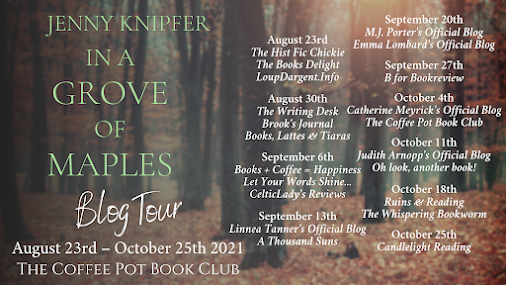
October 6, 2021
The Coffee Pot Book Tour presents Darjeeling Inheritance (The Colonials) by Liz Harris,
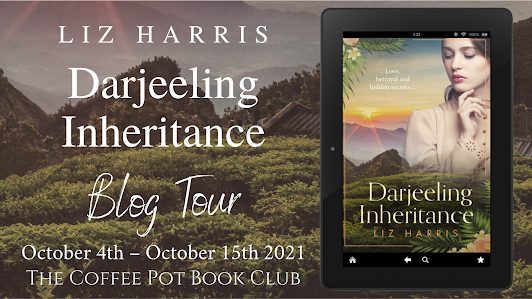
Book Title: Darjeeling Inheritance
Series: The Colonials
Author: Liz Harris
Publication Date: 1st October 2021
Publisher: Heywood Press
Page Length: 365 pages
Genre: Historical Romance
Follow the Tour HERE:

Darjeeling Inheritance
(The Colonials)
By Liz Harris
Darjeeling, 1930
After eleven years in school in England, Charlotte Lawrence returns to Sundar, the tea plantation owned by her family, and finds an empty house. She learns that her beloved father died a couple of days earlier and that he left her his estate. She learns also that it was his wish that she marry Andrew McAllister, the good-looking younger son from a neighbouring plantation.
Unwilling to commit to a wedding for which she doesn’t feel ready, Charlotte pleads with Dan Fitzgerald, the assistant manager of Sundar, to teach her how to run the plantation while she gets to know Andrew. Although reluctant as he knew that a woman would never be accepted as manager by the local merchants and workers, Dan agrees.
Charlotte’s chaperone on the journey from England, Ada Eastman, who during the long voyage, has become a friend, has journeyed to Darjeeling to marry Harry Banning, the owner of a neighbouring tea garden.
When Ada marries Harry, she’s determined to be a loyal and faithful wife. And to be a good friend to Charlotte. And nothing, but nothing, was going to stand in the way of that.
Amazon UK: Amazon US: Amazon CA: Amazon AU:
 Born in London, Liz Harris graduated from university with a Law degree, and then moved to California, where she led a varied life, from waitressing on Sunset Strip to working as secretary to the CEO of a large Japanese trading company.
Born in London, Liz Harris graduated from university with a Law degree, and then moved to California, where she led a varied life, from waitressing on Sunset Strip to working as secretary to the CEO of a large Japanese trading company.Six years later, she returned to London and completed a degree in English, after which she taught secondary school pupils, first in Berkshire, and then in Cheshire.
In addition to the ten novels she’s had published, she’s had several short stories in anthologies and magazines.
Liz now lives in Oxfordshire. An active member of the Romantic Novelists’ Association and the Historical Novel Society, her interests are travel, the theatre, reading and cryptic crosswords. To find out more about Liz, visit her website at: www.lizharrisauthor.com
Website: Twitter: Facebook: LinkedIn: Instagram: Amazon Author Page:
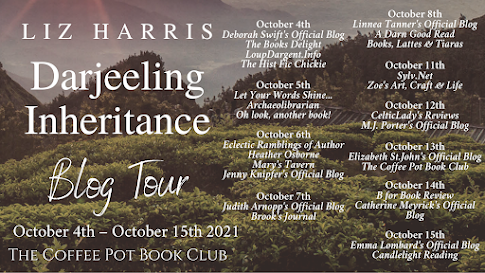
October 3, 2021
S. J. A. Turney joins me on the HWF Hauntings Blog Hop!
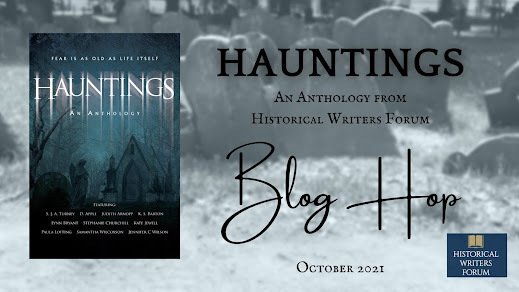
The Romans were an immensely practical people, their forte making things work efficiently. The Greek world had been replete with thinkers and inventors, but it was often the Romans who found practical uses for their dreams. Yet despite the practicality and mundane sense of efficiency that led to Rome conquering most of the known world, there was another side to them.
The Romans had a strange reliance upon superstition that went far beyond religion. Little happened in Rome that was not guided by the belief in divine signs and omens. Generals had called off battles because of a bad sheep’s liver, and emperors rose and fell because the omens suggested it had to happen.
In Plutarch’s life of Marcellus, we are told “At the time of their departure, however, the river that flows through Picenum was seen to be running with blood, and it was reported that at Ariminum three moons had appeared in the heavens, and the priests who watched the flight of birds at the time of the consular elections insisted that when the consuls were proclaimed the omens were inauspicious and baleful for them. At once, therefore, the senate sent letters to the camp, summoning the consuls to return to the city with all speed and lay down their office, and forbidding them, while they were still consuls, to take any steps against the enemy.”
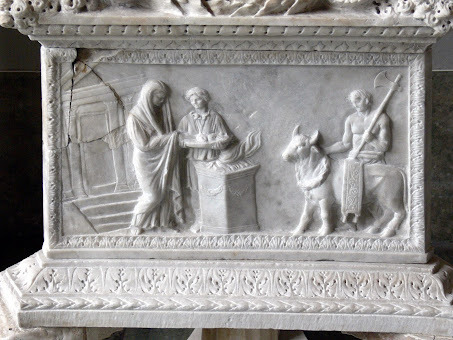
I recently studied the story of the great general Gnaeus Julius Agricola and his campaigns in Britain, as part of my research for several works on the subject, which also led to my supernatural horror tale for the coming Halloween compendium. Among the events recorded by Tacitus in the life of his father-in-law is the invasion of Anglesey and the suppression of the druids, and little in recorded Roman history holds more of a supernatural fascination than that strange sect.
We know almost nothing about the druids. What you generally read concerning druidic culture is mostly 19th and 20th century invention. The Celts did not leave us a written record, and the only accounts of the druids are from Roman sources, written as concerned and fascinated outsiders.
Since they are our only sources, despite an expected level of bias, we have to admit to the likelihood of at least a few grains of truth among the Roman accounts. Caesar’s writing tells us that druids “are concerned with divine worship, the due performance of sacrifices, public and private, and the interpretation of ritual questions: […] who decide in almost all disputes, public and private; and if any crime has been committed, or murder done, or there is any disposes about succession or boundaries, they also decide it, determining rewards and penalties.” Thus in Caesar’s experience, the druids form something that combines the priesthood, the legal system and education, and yet even Caesar notes a dark side to the druids:
“[People] either sacrifice human victims or vow to do so, employing the Druids as ministers for such sacrifices. […] Others use figures of immense size, whose limbs, woven out of twigs, they fill with living men and set on fire, and the men perish in a sheet of flame. They believe that the execution of those who have been caught in the act of theft or robbery or some crime is more pleasing to the immortal gods; but when the supply of such fails they resort to the execution even of the innocent.”
Tacitus, being something of a storyteller himself, gives us a slightly more colourful view. He tells us that the governor decides “to demolish the groves consecrated to their savage cults: for they considered it a duty to consult their deities by means of human entrails.”

Indeed, Tacitus has “a circle of Druids, lifting their hands to heaven and showering imprecations, struck the troops with such an awe at the extraordinary spectacle that, as though their limbs were paralysed, they exposed their bodies to wounds without an attempt at movement.”
Lucan seems to supply a similar image of the Celtic priest class: “There stood a grove […] matted boughs entwined prisoned the air within. No sylvan nymphs here found a home, nor Pan, but savage rites and barbarous worship, altars horrible on massive stones upreared; sacred with blood of men was every tree.”
While our three sources are all Roman and therefore surely biased, agreement between Roman writers on a subject is not hugely common, and the ready correlation between these accounts lends towards a certain veracity, or at least a nugget of truth. The druids of all surviving accounts might be teachers and priests, but they are also bloody, human-sacrificing monsters, who paralyse an army with fear through their supernatural abilities. It is interesting to consider that Tacitus’s audience would be educated Romans, and that therefore this view of druids, with all its magic and horror, was clearly going to be perfectly accepted as true and reasonable by his readers. As are his British women who are, at this same event “flitting between the ranks. In the style of Furies, in robes of deathly black and with dishevelled hair, they brandished their torches.”

One might think that Tacitus was writing horror rather than an account of real events.
Romans, indeed, would be more than ready to accept such tales at face value. Of Piso, on trial, we hear “he had, they said, destroyed Germanicus himself by sorceries and poison, and hence came those ceremonies and horrible sacrifices made by himself and Plancina.”
The Romans, for all their bloodthirsty nature and love of such events as chariot racing and gladiatorial bouts, were oddly squeamish and disapproving of magic and human sacrifice. These things were anathema to the Roman nature, perhaps owing to their somewhat agrarian background and practical ways. Human sacrifice had been banned by Senatorial decree in 97 BC. It was one of the practices attributed to, as well as the druids, the Carthaginians, Rome’s oldest great foe. While all our accounts of these brutal and wicked druids are of suspect Roman origin, such practices as the infamous ‘threefold death’ that might be the cause of the demise of Lindow Man, might lend weight in support of our Roman writers.
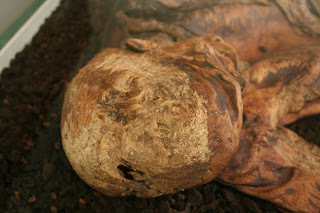
In the destruction of the Celtic caste that drove their resistance to Rome, the invaders under first Suetonius Paulinus and then Agricola wipe out not only a sector of society but all non-Roman evidence of that people. The tale of the black furies and the magical druids awaiting the Roman army on the shores of Anglesey is also the tale of their demise and their removal from history. What remains will likely forever be an enigma. Our image of the druids will always be formed by Caesar, Lucan and Tacitus. And while as a historian we have to always keep one eye on the ‘bias-ometer’, as a reader we can still enjoy the gruesome tales. Vale, and Happy Halloween
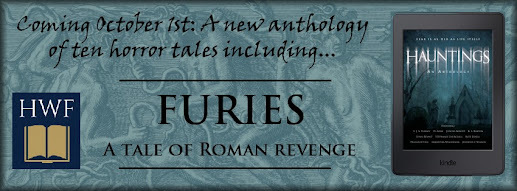
 Having spent much of his childhood visiting historic sites with his grandfather, Simon fell in love with the Roman heritage of the region, beginning with the world famous Hadrian’s Wall. His fascination with the ancient world snowballed with interest in Egypt, Greece and Byzantium, though his focus has remained Rome. A born and bred Yorkshireman with a love of country, history and architecture, Simon spends most of his time visiting historic sites, writing, researching the ancient world and reading.Simon’s career meandered along an eclectic path from the Ministry of Agriculture to network management before settling back into the ancient world, returning to university to complete an honours degree in classical history. With a rekindled love of all things Roman, he set off on a journey to turn Caesar’s Gallic War diaries into a novel accessible to all. Marius’ Mules was completed in 2003 and has garnered considerable, bestseller status and reviews, spawning numerous sequels.
Having spent much of his childhood visiting historic sites with his grandfather, Simon fell in love with the Roman heritage of the region, beginning with the world famous Hadrian’s Wall. His fascination with the ancient world snowballed with interest in Egypt, Greece and Byzantium, though his focus has remained Rome. A born and bred Yorkshireman with a love of country, history and architecture, Simon spends most of his time visiting historic sites, writing, researching the ancient world and reading.Simon’s career meandered along an eclectic path from the Ministry of Agriculture to network management before settling back into the ancient world, returning to university to complete an honours degree in classical history. With a rekindled love of all things Roman, he set off on a journey to turn Caesar’s Gallic War diaries into a novel accessible to all. Marius’ Mules was completed in 2003 and has garnered considerable, bestseller status and reviews, spawning numerous sequels.Now, with in excess of 40 novels available in numerous languages, Simon is a prolific writer, spanning genres and eras and releasing novels both independently and through renowned publishers including Canelo, Head of Zeus, and Orion. Simon’s varied series cover numerous periods of ancient Rome, Medieval and Renaissance Europe, Viking Byzantium, and the Templar Knights. Simon writes full time and is represented by MMB Creative literary agents.
webpage Blog Twitter Facebook Amazon page
September 23, 2021
The Coffee Pot Blog Tour presents: Bloody Dominions (The Conquest Trilogy, Book 1) by Nick Macklin
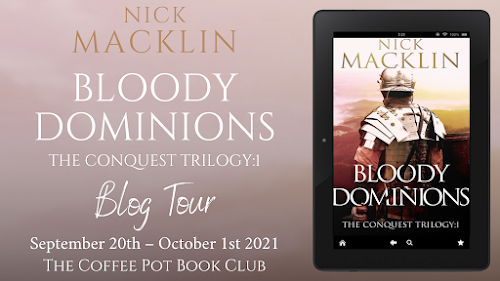
Book Title: Bloody Dominions
Series: (The Conquest Trilogy, Book 1)
Author: Nick Macklin
Publication Date: 28th June 2021
Publisher: Troubador Publishing
Page Length: 368 Pages
Genre: Historical Fiction

Bloody Dominions
(The Conquest Trilogy, Book 1)
By Nick Macklin
Journey with those at the heart of the conflict as Caesar embarks on the tumul-tuous conquest of Gaul 58-51 BC. Book One 58-56 BC.
As Caesar’s campaign begins, tests of courage and belief will confront the three protagonists, shaping them as individuals and challenging their views of the world and each other:
Atticus – an impetuous but naturally gifted soldier, whose grandfather served with distinction in the legions;
Allerix – a Chieftain of the Aduatuci, who finds himself fighting both for and against Caesar; and
Epona – a fierce warrior and Allerixs’ adopted sister.
Experiencing the brutalities of conflict and the repercussions of both victory and defeat, Atticus, Allerix and Epona will cross paths repeatedly, their destinies bound together across time, the vast and hostile territories of Gaul and the barri-ers of fate that have defined them as enemies. In a twist of fate, Atticus and Al-lerix discover that they share a bond, a secret that nobody could ever foresee…
Trigger Warnings: Violence, attempted rape.
Universal link: Amazon UK: Amazon US: Amazon CA: Amazon AU: Barnes and Noble: Waterstones: Kobo: iBooks: Google Play: WHSmith:
 A history graduate, Nick Macklin enjoyed developing the skills that would stand him in good stead during the extensive research he conducted prior to writing his nov-el. Whilst the ancient world unfortunately didn’t feature to any extent in his his-tory degree, (the result of failing miserably to secure the A level grades that would have permitted greater choice) he maintained a lifelong and profound in-terest in ancient history and especially the Roman Empire, continuing to read av-idly as he embarked on a career in HR. Over the next 30 years or so Nick occu-pied a variety of Senior/Director roles, most recently in the NHS. Unsurprising-ly, writing in these roles was largely confined to the prosaic demands of Board papers but Nick never lost the long-harboured belief, motivated by the works of writers such as Robert Fabbri, Robyn Young, Anthony Riches, Simon Scarrow, Matthew Harffy and Giles Kristian, that he too had a story to tell. When he was presented with a window of opportunity c3 years ago he took the decision to place his career on hold and see if he could convert that belief into reality.
A history graduate, Nick Macklin enjoyed developing the skills that would stand him in good stead during the extensive research he conducted prior to writing his nov-el. Whilst the ancient world unfortunately didn’t feature to any extent in his his-tory degree, (the result of failing miserably to secure the A level grades that would have permitted greater choice) he maintained a lifelong and profound in-terest in ancient history and especially the Roman Empire, continuing to read av-idly as he embarked on a career in HR. Over the next 30 years or so Nick occu-pied a variety of Senior/Director roles, most recently in the NHS. Unsurprising-ly, writing in these roles was largely confined to the prosaic demands of Board papers but Nick never lost the long-harboured belief, motivated by the works of writers such as Robert Fabbri, Robyn Young, Anthony Riches, Simon Scarrow, Matthew Harffy and Giles Kristian, that he too had a story to tell. When he was presented with a window of opportunity c3 years ago he took the decision to place his career on hold and see if he could convert that belief into reality. Nick always knew that he wanted to set the novel against the backdrop of a sig-nificant event/period in Roman history. Looking to narrow that down to some-thing offering the potential for meaningful character and plot development, but that hadn’t already received exhaustive coverage, he settled on Caesars tumultu-ous occupation of Gaul. Spanning 8 years, the prolonged clash of cultures of-fered ample opportunity for the kind of dual perspective from which he was hoping to tell the story, whilst the violent conflict provided a wealth of exciting material to explore the changing fortunes of war and its impact at a personal lev-el. The switching of allegiances, nations fighting for and against Rome also pro-vided the potential for some intriguing plot lines. As his research unfolded, he was also struck by just how heavily the Roman psyche during this period was influenced by the scare they had received 50 years earlier when Germanic tribes invaded their territories and defeated their legions. Seeing references to the vet-erans of that war watching their sons and grandsons enlist for a similar cam-paign, he started to think about developing that link on both sides of the con-flict. And so, the idea for the Conquest Trilogy was born.
In Bloody Dominions Nick has sought to produce a novel in which unfolding events are experienced and described from the perspective of protagonists on both sides of Caesar’s incursion into Gaul. Conscious that the role of women in Roman fiction, Boudica aside, is largely confined to spouse, prostitute or slave, Nick wanted to ensure that one of his lead characters was female and a promi-nent member of the warrior clan of her tribe. The novel is driven by these char-acters but the framework against which their stories unfold is historically accu-rate, featuring actual participants in Caesar’s campaign and drawing on real events as they occurred. As such Nick is genuinely excited about his characters and the story they have to tell.
Nick lives in Exeter with his two daughters and is currently juggling work as an Independent HR Consultant with writing the second novel in the Conquest Tril-ogy, Battle Scars.
Twitter: LinkedIn: Goodreads: BookBub:

September 17, 2021
#New Release from Pam Lecky - Her Secret War available for pre-order now!

HER SECRET WAR by Pam Lecky
Published by: Avon Books UK/Harper Collins
Release date: 14th October 2021
A life-changing moment
May 1941: German bombs drop on Dublin taking Sarah Gillespie’s family and home. Days later, the man she loves leaves Ireland to enlist.
A heart-breaking choice
With nothing to keep her in Ireland and a burning desire to help the war effort, Sarah seeks refuge with relatives in England. But before long, her father’s dark past threatens to catch up with her.
A dangerous mission
Sarah is asked to prove her loyalty to Britain through a special mission. Her courage could save lives. But it could also come at the cost of her own…
A gripping story that explores a deadly tangle of love and espionage in war-torn Britain, perfect for fans of Pam Jenoff, Kate Quinn and Kate Furnivall.
Available for Pre-order Now!
 Pam is an Irish historical fiction author with Avon Books UK/Harper Collins. Pam is represented by Therese Coen at the Hardman & Swainson Literary Agency, London.
Pam is an Irish historical fiction author with Avon Books UK/Harper Collins. Pam is represented by Therese Coen at the Hardman & Swainson Literary Agency, London.Her Secret War, a WW2 thriller, will be released in October 2021. The second book in the series will be released in 2022.
The Bowes Inheritance, her debut novel, was awarded the B.R.A.G. Medallion; was shortlisted for the Carousel Aware Prize 2016; made 'Editor's Choice' by the Historical Novel Society; long-listed for the Historical Novel Society 2016 Indie Award; and chosen as a Discovered Diamond in February 2017.
June 2019, saw the release of No Stone Unturned, the first book in the Lucy Lawrence Mystery series, set in the late Victorian era. This was closely followed by the sequel, Footprints in the Sand, in March 2020, which is set in Victorian Egypt. Pam is currently working on the third book in the series.
September 14, 2021
Amy Maroney's Coffee Pot Book Club Blog Tour continues with an excerpt from Island of Gold (Sea and Stone Chronicles)
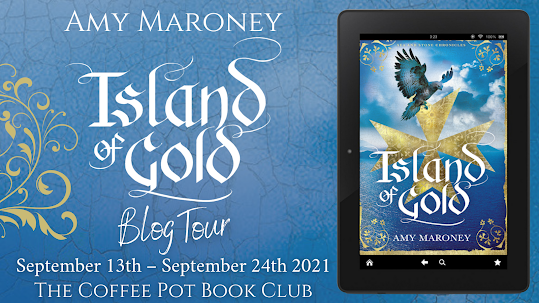
Book Title: Island of Gold
Series: Sea and Stone Chronicles
Author: Amy Maroney
Publication Date: September 8, 2021
Publisher: Artelan Press
Page Length: 380 Pages
Genre: Historical Adventure and Romance

Island of Gold
(Sea and Stone Chronicles)
By Amy Maroney
1454. A noble French falconer. A spirited merchant’s daughter. And a fateful decision that changes their destiny forever.
When Cédric is recruited by the Knights Hospitaller to the Greek island of Rhodes, his wife Sophie jumps at the chance to improve their fortunes. After a harrowing journey to Rhodes, Cédric plunges into the world of the knights—while Sophie is tempted by the endless riches that flow into the bustling harbor. But their dazzling new home has a dark side.
Slaves toil endlessly to fortify the city walls, and rumors of a coming attack by the Ottoman Turks swirl in the streets. Desperate to gain favor with the knights and secure his position, Cédric navigates a treacherous world of shadowy alliances. Meanwhile, Sophie secretly engineers a bold plan to keep their children safe. As the trust between them frays, enemies close in—and when disaster strikes the island, the dangers of their new world become terrifyingly real.
With this richly-told story of adventure, treachery, and the redeeming power of love, Amy Maroney brings a mesmerizing and forgotten world to vivid life.
Read an Excerpt
Spring, 1440
Bruges, Flanders
The Portier family entered the church one by one. The warm, stale air smelled faintly of beeswax. Sophie followed Papa, Maman, and Grégoire down the main aisle of the nave to their appointed spot, about three-quarters of the way back from the altar. Behind the altar a three-paneled painting of saints and angels was affixed to the stone wall. Above it, a round window made of colorful stained glass let in filtered sunlight. Sophie stared up at it, mesmerized by the beauty. Ensconced between her parents, she did not hear Cédric de Montavon slip into the pew. Her family’s murmured greetings to him brought her back to the moment. She turned her head and met the falconer’s eyes.
He nodded at her in silence as he took his seat. Flushing, she lowered her eyelids. When she raised them again, he was still looking her way, a faint expression of surprise on his face. She was accustomed to seeing that expression on a man’s face when he first encountered her. Papa took great pride in the attention she attracted.
Like moths to a flame, he often said.
Usually, Sophie found the attention of men annoying. But this time, she felt a powerful tug of attraction. The heat in her throat and cheeks swept into her chest, then settled languidly just above her hips.
The priest began to speak. The familiar Latin words of Mass soon lulled her into a stupor. For a while she trained her eyes on the rosy light spilling forth from the stained glass window above the altar. Then she tried glimpsing Cédric de Montavon from the corner of her eye without turning her head.
She could see the falconer’s fine black leather boots, the dark green hose he wore, his hands resting on his thighs. His slender, sun-browned fingers were a stark contrast to her father’s plump white ones.
The priest droned on and on. She prayed for Mass to end.
Finally, it did. They all stood and filed back down the aisle through the tall doors of the church to the sunlit square beyond. It was a crisp spring day, with a gentle breeze that whispered over her cheeks. Sophie stood with Maman. They discussed the Flemish ladies’ elaborate head coverings, the fine drape of their cloaks, the foreign sounds of their language drifting overhead. Gregoire and the falconer chatted with Papa about business matters, about trade and war and commerce and tariffs.
Several merchants joined them, their attention focused on Monsieur de Montavon. They peppered him with questions about falcons and his work for the count. Sophie watched him respond, admiring his confident manner, the strong line of his jaw, the hard angles of his cheekbones. She stared at his well-formed lips, at his short, carefully-trimmed beard.
“Sophie,” Maman said. “Did you not hear Monsieur de Montavon?”
She scrambled to find her voice, feeling oddly shy.
“Forgive me, sir,” she murmured. “What was your question?”
“How do you find Bruges, mademoiselle?” he asked. “Is it to your liking?”
His brown velvet doublet was criss-crossed with green silk thread embroidered in a diamond-shaped pattern. She was struck with an impulse to run her fingers across the raised ridges of the thread.
“I have lost my heart to Bruges,” she admitted, favoring him with a smile. “I would like to come back every year. It’s a beautiful city, not like Toulouse at all.”
“And what is wrong with Toulouse?” Papa said, pretending to be hurt, but with a mocking gleam in his eyes.
While there were a few rich pastel merchants like him in Toulouse, the city of Sophie’s birth was essentially an overgrown farm town riddled with abandoned and decaying buildings, still not entirely recovered from the plague that had ravaged the world a few generations ago.
“Papa,” she laughed. “How can we compare the two? It is like comparing a stone with a pearl.”
Papa grinned. “Too true, my child. There are treasures to be found here and nowhere else. Like gyrfalcons.” He glanced meaningfully at Monsieur de Montavon.
“Indeed,” the falconer replied.
“Gyrfalcons!” a merchant cried. “Why, aren’t they the most costly birds on earth?”
Monsieur de Montavon shrugged. “It depends on the age of the bird, the color of its feathers, the condition of its health.”
“What color feathers are best, monsieur?” Sophie asked.
“White gyrfalcons are the most coveted,” the falconer responded. His eyes were brown, with flecks of green and gold that caught the light. “After the molt, of course, the feathers can change color. So a bird that begins gray can turn white. But one never knows if it will.”
Grégoire pointed at the doors of the church. “Look there. Isn’t that the Catalan we saw on the Norwegian’s ship?”
Sophie watched a dark-haired man with a short beard emerge from church in the company of two other well-dressed gentlemen.
“Yes,” Papa concurred. “One and the same.”
Perhaps sensing the eyes upon him, the Catalan glanced their way. For the second time in one day, Sophie felt the curious prickling sensation of attraction under a man’s scrutiny. He was nearly as handsome as the falconer, and more elegantly dressed.
“We were gaming on a Norwegian’s ship and met that man, an agent of the Knights Hospitaller,” Grégoire told the gathered men. “He was buying gyrfalcons for someone of great rank.”
“Perhaps the King of Cyprus,” mused Papa. “Imagine having a friend connected to the Cypriot court. The trade in camlets and cloth of gold would open up to us immediately.”
“Cloth of gold has gotten harder and harder to find,” one of the merchants complained. “The Genoese had a steady trade in it for a time, but pirates have made a mess of the shipping lanes in Greece. Sometimes Venetian merchants show up here with a few bolts, but the price!”
“Outrageous,” Papa agreed. “I’ve a mind to hire a gold-beater or two, set up an atelier, and make the blasted stuff myself.”
The men launched into a discussion about cloth prices and the perils of maritime shipping. Sophie had heard versions of this conversation too many times to count. Luckily, she stood directly opposite Monsieur de Montavon and had an unobstructed view of his face. He seemed distracted by the presence of the Catalan. He glanced at the man repeatedly. Then his expression tightened as the Catalan and his companions moved toward their group.
“We never had a chance to be properly introduced,” the man said in French, sweeping into a polite bow. “Those business transactions leave little time for pleasantries.” He looked straight at the falconer. “Your name, sir?”
The falconer gave a shallow bow. “Cédric de Montavon. And yours?”
“Nicolau Baldaia.” The Catalan turned to Sophie’s father expectantly.
“Henri Portier, at your service, sir,” Papa said. “And my son, Grégoire.”
The Catalan nodded at them both, then looked at Maman. “Madame Portier, I am honored to meet you,” he said without waiting for an introduction. His eyes slid to Sophie. “And who is this?”
“Our daughter, Sophie,” Maman said, hooking an arm around Sophie’s waist.
The gesture should have felt reassuring, but instead Sophie felt trapped. The Catalan’s bold stare was oddly possessive, as if just with a look he had taken ownership of her. A fragment of fear penetrated her consciousness. She longed to escape the Catalan’s inspection.
Fortunately, the merchants began to lob questions at him about his work for the knights, about news from Rhodes, about trade in far-off ports like Alexandria and Famagusta. Relieved, Sophie let her eyes drift back to the falconer just as he looked in her direction, his lips quirking in a slight smile.
Her heart thrashing like an eel in a basket, Sophie smiled in return.
This novel is available on #KindleUnlimited
Universal Link: Amazon UK: Amazon US: Amazon CA: Amazon AU:
 Amy Maroney lives in the Pacific Northwest with her family, and spent many years as a writer and editor of nonfiction before turning her hand to historical fiction. When she's not diving down research rabbit holes, she enjoys hiking, dancing, traveling, and reading. Amy is the author of the Miramonde Series, a trilogy about a Renaissance-era female artist and the modern-day scholar on her trail. To receive a free prequel novella to the Miramonde Series, join Amy's readers' group at www.amymaroney.com.
Amy Maroney lives in the Pacific Northwest with her family, and spent many years as a writer and editor of nonfiction before turning her hand to historical fiction. When she's not diving down research rabbit holes, she enjoys hiking, dancing, traveling, and reading. Amy is the author of the Miramonde Series, a trilogy about a Renaissance-era female artist and the modern-day scholar on her trail. To receive a free prequel novella to the Miramonde Series, join Amy's readers' group at www.amymaroney.com.
Website: Twitter: Facebook: Instagram: Pinterest: Book Bub: Amazon Author Page: Goodreads:
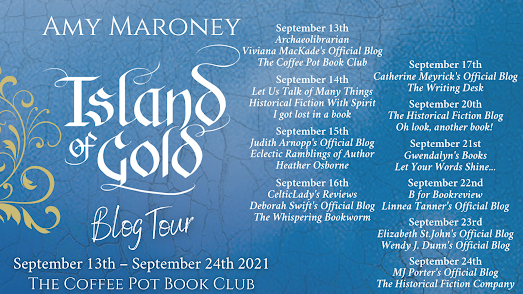
August 20, 2021
New Release from Annie Whitehead Coming Soon!

The Sins of the Father (Release date Sep 15th, on pre-order now)
A father’s legacy can be a blessing or a curse...
AD658: The sons of Penda of Mercia have come of age. Ethelred, the youngest, recalls little of past wars while Wulf is determined to emulate their father, whose quest to avenge his betrayed kinswomen drew him to battle three successive Northumbrian kings.
Ecgfrith of Northumbria is more hostile towards the Mercians than his father was. His sister Ositha, thwarted in her marriage plans, seeks to make her mark in other ways, but can she, when called upon, do her brother’s murderous bidding?
Ethelred finds love with a woman who is not involved in the feud, but fate intervenes.
Wulf’s actions against Northumbria mean Ethelred must choose duty over love, until he, like his father before him, has cause to avenge the women closest to him. Battle must once more be joined, but the price of victory will be high.
Can Ethelred stay true to his father’s values, end the feud, keep Mercia free, and find the path back to love?
This is the second of the two-book series, Tale of the Iclingas, which began with Cometh the Hour, but can be read as a standalone.

Book One - Cometh the Hour is on 99p Promotion. You can pick up a copy here: mybook.to/ComeththeHour
"An excellent historical tale, told with energy, enthusiasm, and a love of the period. I will be back for more."

August 19, 2021
The next stop on Anna Belfrage's Coffee Pot Book Club Blog Tour!
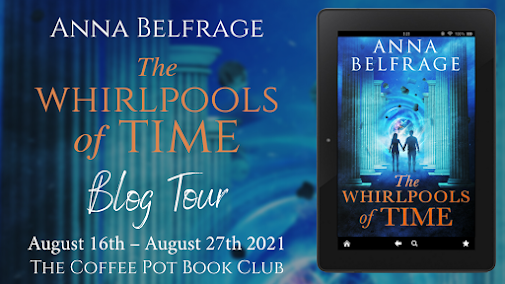
Book Title: The Whirlpools of Time
Author: Anna Belfrage
Publication Date: 11th June 2021
Publisher: Timelight Press
Page Length: 388 Pages
Genre: Time travel romance, Scottish Historical Romance

The Whirlpools of Time
By Anna Belfrage
He hoped for a wife. He found a companion through time and beyond.
It is 1715 and for Duncan Melville something fundamental is missing from his life. Despite a flourishing legal practice and several close friends, he is lonely, even more so after the recent death of his father. He needs a wife—a companion through life, someone to hold and be held by. What he wasn’t expecting was to be torn away from everything he knew and find said woman in 2016…
Erin Barnes has a lot of stuff going on in her life. She doesn’t need the additional twist of a stranger in weird outdated clothes, but when he risks his life to save hers, she feels obligated to return the favour. Besides, whoever Duncan may be, she can’t exactly deny the immediate attraction.
The complications in Erin’s life explode. Events are set in motion and to Erin’s horror she and Duncan are thrown back to 1715. Not only does Erin have to cope with a different and intimidating world, soon enough she and Duncan are embroiled in a dangerous quest for Duncan’s uncle, a quest that may very well cost them their lives as they travel through a Scotland poised on the brink of rebellion.
Will they find Duncan’s uncle in time? And is the door to the future permanently closed, or will Erin find a way back?
Trigger Warnings: Sexual Content. Violence.
***
Whirlpool: In which Duncan ends up holding magic in his hands
Her fear was contagious. Erin might scoff and tell him she had things handled, but over the coming days he’d catch her glancing out the window every other minute and the way she hugged herself when he said something about that accursed Steve Wilkes had him wishing he’d run him through with his sword the first time he’d met the unsavoury character.
She refused to talk about it, insisting they were safe here, in her home because they’d never be able to sneak up on them.
“They do not need to sneak,” he’d said. “It is not exactly an impenetrable fortress this, is it?”
Which is when she’d proudly shown him something she called the panic room. Aye, this cramped dark space did have him breaking out in something akin to panic, even more so when she explained it was sufficiently stocked with water and foodstuffs to last a couple of days.
“In the dark?” He detested dark and cramped places.
“Not entirely,” she said, “but yeah, it won’t exactly be brightly lit.”
Not much of a comfort, but he nodded all the same while thinking he would rather die out in the sunlight than end up buried alive in here.
“There’s a secure phone line,” she told him. “If we’re in here, I can call the cops.”
That made him feel much better. But still, hours in a space which had room for a narrow pallet bed and not much else was something best avoided. There was a small box tucked into a corner. “What’s that?”
“That’s where I keep the locket.” She slid him a look. “I prefer to keep it in here, in that metal box.”
“To keep it safe,” he assumed.
“Yeah. And because…”
“Because what?”
“It weirds me out.” She laughed shakily. “Silly, right? Emily always said it was the power contained within that I reacted to, but that is just stupid.”
“Can I see it?” he asked, while concluding that weirding someone out was to make them singularly uneasy.
Reluctantly, she nodded. “Be my guest. I’ll just stay here, okay?”
With Erin hovering at the door, he lifted the lid an inch before slamming it back down. “It hums!”
“I know.”
Intrigued, Duncan opened the box. Inside, was a round, wooden container of sorts, badly charred but sufficiently undamaged to reveal the remains of exquisite woodworking, a pattern of leaves encircling what looked like a huge thistle. Whoever had made this little box had been a true artist, he thought, lifting it up carefully. A soft, soothing humming filled the room, caressed his ears. Like a lullaby, he thought, a comforting sound that had him recalling nights as a small child, with Simon reading to him by the light of a flickering candle.
Inside the box was a golden object, resting on plush, red velvet. The size of an egg, it was a beautiful piece of work, the detailed engravings studded with little rubies and diamonds. Even in the weak light, the stones glittered and twinkled, and the humming urged him to pick it up, hold it. When he did, the humming increased in strength, a hypnotic request that he open it, open it and look deep within.
He fumbled with the clasp.
“Duncan, no!” Erin said, but it was too late, the locket lay open in his hand, and the interior was as beautiful as the exterior—except that now he was looking at a beautifully executed piece of art, a whirlwind of blues and green and right in its midst a beckoning point of white. The humming became a roaring command. “Look,” it said, “look deep and fall!” His heart cramped. No, no, no, his brain wailed, and he gritted his teeth with the effort of attempting to close his eyes and break the connection with the magical swirls that seemed to grow out of the locket to dance around him in thin bands of green and blue.
“Duncan!” Erin shrieked, and next he knew she’d knocked the locket out of his hand, sending it spinning to rest in a corner.
He collapsed, breathing heavily. His pulse thundered through his head, and he was covered in a sheen of cold sweat. He’d recognised those swirls of colour and the fear they’d induced, knew exactly when he’d seen them last.
“Duncan?” She sounded on the verge of tears. “You okay?”
“Yes,” he croaked.
“You began to blur around the edges,” she said with a groan. “What is that thing?” She was in his arms, pressing her face to his shirt. “Maybe I should just give it to that cow Josephine and watch her go all invisible.”
“That is a powerful object,” he managed to say. “And in the hands of a ruthless person likely quite dangerous.” He licked his lips. A portal, of sorts, he thought. Someone had captured the terrifying funnel he’d fallen through in enamelled paint. Bile filled his mouth. To fall again…The fear, the pain, the unbearable noise and at the end of it all to land in a new unfamiliar place. “Dearest Lord, keep me safe,” he prayed in an undertone, before gently disengaging himself from Erin. “I need to get out of here.”
From the corner came a faint humming. He hurried them both out of the room and Erin slammed the door shut before sliding the wall panel that hid it back into place.
Available on #KindleUnlimited.

Had Anna been allowed to choose, she’d have become a time-traveller. As this was impossible, she became a financial professional with two absorbing interests: history and writing. Anna has authored the acclaimed time travelling series The Graham Saga, set in 17th century Scotland and Maryland, as well as the equally acclaimed medieval series The King’s Greatest Enemy which is set in 14th century England.
Anna has also published The Wanderer, a fast-paced contemporary romantic suspense trilogy with paranormal and time-slip ingredients. Her September 2020 release, His Castilian Hawk, has her returning to medieval times. Set against the complications of Edward I’s invasion of Wales, His Castilian Hawk is a story of loyalty, integrity—and love. Her most recent release, The Whirlpools of Time, is a time travel romance set against the backdrop of brewing rebellion in the Scottish highlands.
All of Anna’s books have been awarded the IndieBRAG Medallion, she has several Historical Novel Society Editor’s Choices, and one of her books won the HNS Indie Award in 2015. She is also the proud recipient of various Reader’s Favorite medals as well as having won various Gold, Silver and Bronze Coffee Pot Book Club awards.
Find out more about Anna, her books and her eclectic historical blog on her website, www.annabelfrage.com
Website: Twitter: Facebook: Instagram: BookBub: Amazon Author Page: Goodreads:
